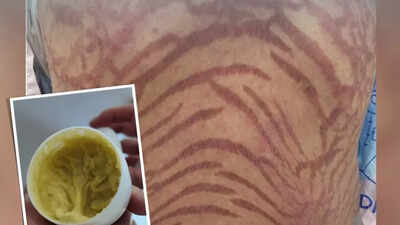ARTICLE AD BOX

A shocking medical case in China has sparked nationwide concern over the dangers of unregulated skincare products marketed as “pure traditional Chinese medicine” (TCM). A 40-year-old woman, identified as Tingting, developed striking purplish-red, snake-like patterns across her body after applying a so-called herbal cream daily for ten years, according to South China Morning Post (SCMP).
Initially used to treat an itchy rash, the ointment appeared effective at first but led to severe side effects, including hormonal imbalance and skin damage. Doctors later found the product likely contained hidden steroids, revealing the serious health risks of self-medicating with unverified “natural” remedies. The case has reignited public debate about the need for stricter regulation of online TCM products in China.
Tingting’s long-term use of “pure TCM” cream causes snake-like skin condition
Tingting’s story started a decade ago when she first noticed red, itchy patches on her right leg. Like many others, she turned to the internet for answers rather than seeking medical advice. While searching, she discovered a skincare product advertised as a miracle cure. The seller claimed the ointment was made from “pure traditional Chinese medicine” and could “cure all skin diseases.”The product seemed convincing. Tingting purchased it and began applying it daily.
Within days, her symptoms improved, the itching stopped, and the rash faded. Believing the cream had truly healed her skin, she continued to use it long-term. Over the next ten years, she spent more than 100,000 yuan (about £11,000) buying the same ointment, confident it was keeping her condition under control.Over time, subtle warning signs began to appear. Tingting noticed her skin becoming more fragile and discoloured.
Gradually, purple-red streaks resembling snake scales appeared across her body. She also developed swelling in her lower limbs, frequent nausea, vomiting, and numbness in her hands. Despite these alarming symptoms, she did not stop using the cream.When her condition became unbearable, Tingting was admitted to Zhongda Hospital at Southeast University in Nanjing. Upon examination, doctors discovered extensive damage: her entire body was covered in fissured, snake-like markings.
Further tests revealed that her cortisol levels, essential for regulating blood pressure and stress, had dropped dangerously low.
Doctors link Tingting’s condition to hidden steroids in “pure TCM” cream
Chief dermatologist Wang Fei diagnosed her with secondary adrenocortical insufficiency, a disorder where the adrenal glands fail to produce enough hormones. This condition is often triggered by prolonged use of steroid-based creams.Dr Wang explained that many so-called “herbal” or “hormone-free” ointments on the market secretly contain corticosteroids to deliver quick results.
These steroids reduce inflammation and itching rapidly, making users feel like the product is effective. However, continued exposure allows the body to absorb the steroids through the skin, which can suppress the adrenal glands over time. Once the adrenal glands are weakened, they struggle to produce cortisol naturally, leading to fatigue, dizziness, nausea, swelling, and serious hormonal imbalances, all of which Tingting experienced.
Unregulated “pure TCM” skincare products pose hidden health risks in China
The case has highlighted a growing problem in China’s skincare market: the widespread sale of unregulated topical creams marketed as “pure TCM.” Many such products are not approved by medical authorities, and sellers use misleading claims to promote them as safe, herbal, and chemical-free. In reality, these ointments often contain undisclosed pharmaceutical substances, including potent steroids. The combination of deceptive marketing and public trust in traditional medicine creates a dangerous environment where consumers unknowingly expose themselves to long-term harm.Experts warn that products labelled “natural” or “herbal” are not always safe. Without official testing and regulation, there is no guarantee that the ingredients listed are accurate. For instance, corticosteroids can thin the skin, cause stretch marks, weaken blood vessels, and disrupt the endocrine system side effects that can take years to reverse.
Viral reaction sparks public outrage and calls for stricter regulation of TCM skincare products
When Tingting’s story was reported by local media, it quickly went viral on Chinese social platforms such as Weibo and Douyin.
Thousands of users expressed disbelief that she had self-medicated for so long without consulting a doctor. One commenter wrote, “She used it for ten years without going to the hospital? That’s terrifying.” Another said, “These sellers should be punished. They use people’s trust in traditional medicine for profit.
”The incident has triggered renewed calls for stricter regulation of online health and beauty products.
Many Chinese netizens also discussed the blurred line between authentic TCM practices and counterfeit “herbal” products manufactured without quality control. Dr Wang and other dermatologists have urged the public to be cautious about using any topical medication, especially those claiming to work instantly.
They emphasise that genuine treatment requires diagnosis, medical supervision, and professional prescriptions.“Steroids can relieve symptoms quickly, but that doesn’t mean they’re harmless,” Dr Wang explained. “Used improperly, they can lead to severe systemic damage. Skin medications, especially hormone-based ones, must never be used without professional guidance.” He further advised that consumers should buy skincare or medicinal creams only from licensed pharmacies or hospitals and report suspicious products to authorities.
Urgent need for stricter regulation and public awareness on TCM skincare
Experts agree that Tingting’s case underscores the urgent need for stricter oversight of skincare and TCM-based products in China. Regulators must ensure clearer labelling, tighter quality inspections, and harsher penalties for sellers who mislead consumers with false “all-natural” claims.At the same time, public education about the dangers of self-medication remains essential. Many people turn to alternative remedies because they believe natural equals safe.
However, as this case demonstrates, prolonged misuse of unverified treatments can have devastating consequences. After medical treatment, Tingting’s condition has begun to stabilise, though doctors warn that recovery from hormone suppression may take months or even years.
Her story serves as a sobering reminder that not all remedies labelled “traditional” or “herbal” are safe.Traditional Chinese Medicine, when practiced correctly by licensed practitioners, can provide legitimate health benefits. But counterfeit or adulterated versions sold online can cause irreversible harm. Tingting’s experience highlights an important lesson: self-medication and blind trust in online “miracle cures” can turn a minor skin problem into a lifelong health battle.Also Read | Rare black-headed Ibis spotted in Thoothukudi Salt Pans; boosting wetland recovery and a promising future for migratory birds

 1 hour ago
4
1 hour ago
4









 English (US) ·
English (US) ·